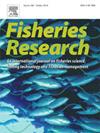增加的复杂性是否提高了性能:评估一个受约束的生物量动力学模型和经验收获控制规则
IF 2.2
2区 农林科学
Q2 FISHERIES
引用次数: 0
摘要
生物量动态模型是在数据有限的情况下常用的种群评估方法。我们提出了一种基于新的约束性生物量动态模型(“动态第4层”)的管理策略,作为澳大利亚南部和东部鳞鱼和鲨鱼渔业(SESSF)目前应用的经验管理策略(“经验第4层”)的替代方案。动态的第4层管理战略受到限制,因为它所基于的生物量动态模型涉及的假设是,与生物量目标相对应的产量发生在一组预先指定的参考年份。这与经验性第4层管理策略所做的假设相同。管理策略评估用于在拟合动态第4层方法时评估三种会计误差方法中的绩效,并根据经验第4层管理策略以及基于使用股票综合(“第1层”)实施的综合评估的管理策略来评估绩效。最后,探讨了经验第4层和动态第4层管理策略对预先指定参考年的错误选择的敏感性。结果表明,与经验的第4层管理策略相比,动态第4层管理策略提高了绩效。正如预期的那样,数据丰富的第1层管理策略具有最佳性能。与经验的第4层管理策略相比,动态第4层管理策略降低了库存低于极限参考点的概率,减少了捕获变异性,并且对不正确的参考年选择不那么敏感。这些结果表明,动态第4层管理策略是SESSF中经验第4层管理策略的合适替代方案,更一般地说,可以被认为是在数据有限的情况下形成管理建议基础的可靠选择。本文章由计算机程序翻译,如有差异,请以英文原文为准。
Does increased complexity improve performance: Evaluating a constrained biomass dynamics model and an empirical harvest control rule
Biomass dynamics models are a common stock assessment method applied in-data limited situations. We present a management strategy based on a new constrained biomass dynamics model (‘dynamic tier 4’) as an alternative to the currently applied empirical management strategy (‘empirical tier 4’) used in Australia’s Southern and Eastern Scalefish and Shark Fishery (SESSF). The dynamic tier 4 management strategy is constrained because the biomass dynamics model on which it is based involves the assumption that yield corresponding to the biomass target occurred during a pre-specified set of reference years. This is the same assumption that is made by the empirical tier 4 management strategy. Management strategy evaluation is used to evaluate performance among three ways of accounting for error when fitting the dynamic tier 4 approach, and to evaluate performance against the empirical tier 4 management strategy as well as a management strategy based on an integrated assessment implemented using Stock Synthesis (‘tier 1’). Finally, the sensitivity of the empirical tier 4 and dynamic tier 4 management strategies to an incorrect choice for the pre-specified reference years is explored. The results demonstrate improved performance by the dynamic tier 4 management strategy compared to the empirical tier 4 management strategy. As expected, the data-rich, tier 1 management strategy had the best performance. The dynamic tier 4 management strategy has a reduced probability of the stock falling below the limit reference point, reduced catch variability and is less sensitive to incorrect reference year choice than the empirical tier 4 management strategy. These results demonstrate that the dynamic tier 4 management strategy is a suitable alternative to the empirical tier 4 management strategy in the SESSF, and more generally, can be considered as a robust option for forming the basis for management recommendations for data-limited situations.
求助全文
通过发布文献求助,成功后即可免费获取论文全文。
去求助
来源期刊

Fisheries Research
农林科学-渔业
CiteScore
4.50
自引率
16.70%
发文量
294
审稿时长
15 weeks
期刊介绍:
This journal provides an international forum for the publication of papers in the areas of fisheries science, fishing technology, fisheries management and relevant socio-economics. The scope covers fisheries in salt, brackish and freshwater systems, and all aspects of associated ecology, environmental aspects of fisheries, and economics. Both theoretical and practical papers are acceptable, including laboratory and field experimental studies relevant to fisheries. Papers on the conservation of exploitable living resources are welcome. Review and Viewpoint articles are also published. As the specified areas inevitably impinge on and interrelate with each other, the approach of the journal is multidisciplinary, and authors are encouraged to emphasise the relevance of their own work to that of other disciplines. The journal is intended for fisheries scientists, biological oceanographers, gear technologists, economists, managers, administrators, policy makers and legislators.
 求助内容:
求助内容: 应助结果提醒方式:
应助结果提醒方式:


